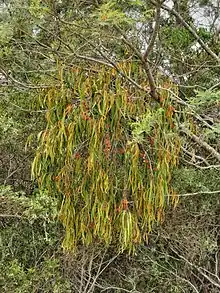| Amyema | |
|---|---|
 | |
| ↑A. pendula, habit; ↓A. gibberula, flowers | |
.jpg.webp) | |
| Amyema gibberula var. gibberula | |
| Scientific classification | |
| Kingdom: | Plantae |
| Clade: | Tracheophytes |
| Clade: | Angiosperms |
| Clade: | Eudicots |
| Order: | Santalales |
| Family: | Loranthaceae |
| Genus: | Amyema Tiegh. |
| Species | |
|
See text | |
| Synonyms | |
Amyema is a genus of semi-parasitic shrubs (mistletoes) which occur in Malesia and Australia.
Etymology
Amyema derives from the Greek: a (negative), and myeo (I initiate), referring to the genus being previously unrecognised.[3]
Description
Hamilton & Barlow describe the haustorial structures of most Australian Amyemas as being ball-like, with some exceptions.[4]
Species
There are approximately 90 species including the following:
- Amyema arthrocaulis Barlow
- Amyema artensis (Mont.) Dan. (indigenous to Upolu and Savai'i, known as tapuna.)
- Amyema benthamii (Blakely) Danser
- Amyema betchei (Blakely) Danser
- Amyema bifurcata (Benth.) Tiegh.
- Amyema biniflora Barlow
- Amyema brassii Barlow
- Amyema brevipes (Tiegh.) Danser
- Amyema cambagei (Blakely) Danser
- Amyema congener (Sieber ex Schult. & Schult.f.) Tiegh.
- Amyema conspicua (F.M.Bailey) Danser
- Amyema dolichopoda Barlow
- Amyema duurenii Barlow
- Amyema eburna (Barlow) Barlow
- Amyema fitzgeraldii (Blakely) Danser - pincushion mistletoe
- Amyema gaudichaudii (DC.) Tiegh.
- Amyema gibberula (Tate) Danser
- Amyema glabra (Domin) Danser
- Amyema haematodes (O.Schwarz) Danser
- Amyema herbertiana Barlow
- Amyema hilliana (Blakely) Danser
- Amyema linophylla (Fenzl) Tiegh.
- Amyema lisae Pelser & Barcelona
- Amyema lucasii (Blakely) Danser
- Amyema mackayensis (Blakely) Danser
- Amyema maidenii (Blakely) Barlow
- Amyema melaleucae (Lehm. ex Miq.) Tiegh.
- Amyema microphylla Barlow
- Amyema miquelii (Lehm. ex Miq.) Tiegh. - stalked mistletoe
- Amyema miraculosa (Miq.) Tiegh.
- Amyema nestor (S.Moore) Danser
- Amyema nickrentii Barcelona & Pelser
- Amyema pendula (Sieber ex Spreng.) Tiegh. - drooping mistletoe
- Amyema preissii (Miq.) Tiegh. - wireleaf mistletoe
- Amyema quandang (Lindl.) Tiegh.
- Amyema quaternifolia Barlow
- Amyema queenslandica (Blakely) Danser
- Amyema sanguinea (F.Muell.) Danser
- Amyema seemeniana (K.Schum.) Danser
- Amyema subcapitata Barlow
- Amyema tetraflora (Barlow) Barlow
- Amyema tetrapetala (Danser) Barlow
- Amyema thalassia Barlow
- Amyema tridactyla Barlow
- Amyema tristis (Zoll.) Tiegh.
- Amyema verticillata (Merr.) Danser
- Amyema villiflora (Domin) Barlow
- Amyema whitei (Blakely) Danser
Faunal associations
The mistletoebird is known to consume the fruit of Amyema quandang[5] as well as other mistletoe species from which its name is derived.
Larvae of the butterfly genus Delias often use various Amyema species as larval food plants. In doing so, the adults acquire a taste that is unpalatable to predators.[6]
Uses
The fruit of Amyema species is high in protein, lipids, and carbohydrates, and was eaten by the Ngunnawal people.[7]
References
- ↑ IPNI Amyema. International Plant Name Index. Retrieved 1 August 2018.
- ↑ M. Ph. Van Tieghem (January 1894). "Sur Le Groupement Des Espèces En Genres Dans Les Loranthacées A Calice Dialysépale Et Anthéres Basifixes". Bulletin de la Société Botanique de France (in French). 41 (6): 506. doi:10.1080/00378941.1894.10831632. ISSN 0037-8941. Wikidata Q54801450.
- ↑ Barlow, B.A. (1984). "Flora of Australia Online: Amyema, Data derived from Flora of Australia Volume 22, a product of ABRS, ©Commonwealth of Australia". Archived from the original on 9 May 2018. Retrieved 9 May 2018.
- ↑ S.G.Hamilton; B.A. Barlow (1963). "Studies in Australian Loranthaceae. II. Attachment Structures and their Interrelationships". Proceedings of the Linnean Society of New South Wales. 88: 74–90. ISSN 0370-047X. Wikidata Q106588754.
- ↑ Reid, Nick (June 1990). "Mutualistic interdependence between mistletoes (Amyema quandang), and spiny-cheeked honeyeaters and mistletoebirds in an arid woodland". Austral Ecology. 15 (2): 175–190. doi:10.1111/j.1442-9993.1990.tb01526.x.
- ↑ Orr & Kitching (2010). The Butterflies of Australia. Jacana Books. ISBN 9781741751086.
- ↑ Ngunnawal Elders & their families. 2014. Ngunnawal Plant Use, ACT Government, ISBN 9781921117152
External links
- "Amyema". Australian Plant Name Index (APNI), IBIS database. Centre for Plant Biodiversity Research, Australian Government, Canberra. Retrieved 2007-10-08.
- "Amyema". FloraBase. Western Australian Government Department of Biodiversity, Conservation and Attractions.
- "Amyema". PlantNET - New South Wales Flora Online. Royal Botanic Gardens & Domain Trust. Archived from the original on 8 September 2007. Retrieved 2007-10-08.